The Jade Peony by Wayson Choy
Wayson Choy’s novel follows a Chinese Canadian family in Vancouver around the time of World War II, through the eyes of the three youngest children. The story draws on the history of Chinese labourers on the railway, the perpetual navigations of and tensions caused by cultural difference, perceptions of Japanese Canadians, and other national and cultural identifications dominant at the time.
Nationalism, 1960s onwards: Multiculturalism
In the 1960s and 70s, the unified vision of a culturally homogeneous nation run by elite white men was fractured by civil rights movements against racial discrimination, the women’s movement, and the Quiet Revolution in Quebec. The Quiet Revolution, which became noisier over time, led to the referendums on sovereignty in 1980 and 1995 because of the division between federalist and sovereignist political factions.
Canada Reads
Canada Reads is a CBC Radio program that was launched in English in 2002 and in 2004 in French as Le Combat des livres. Over the course of a week in five one-hour segments, five celebrity judges champion a book and engage in debate about which one Canadians should read. Each day a book is voted off the list until only one is left standing. The format of the program is often compared to reality TV shows such as Survivor. The show playfully foregrounds conflict in its branding, using taglines such as “battle of the books” or “literary title fight” (CBC). That said, the champion book carries a lot of cultural cachet and the show has had enormous impact on the development of a popular Canadian reading public.
Nationalism, 1950s–1970s: Cultural Nationalism, the Massey Commission, and Thematic Criticism
A form of nationalism particularly relevant to the study of Canadian literature is cultural nationalism, which argues for the support, recognition, and preservation of cultural institutions and products as necessary elements of national identity. This nationalism has sometimes been driven by a desire for self-articulation and sometimes by cultural protectionism.
Funny Boy by Shyam Selvadurai
Shyam Selvadurai’s novel Funny Boy presents the coming of age of Arjie, a young, gay, Tamil boy in Sri Lanka. Set against the backdrop of Sri Lankan social and cultural politics of the 1980s, the novel explores the barriers around love, marriage, gender expectations, and cultural tensions, specifically in the Sinhala and Tamil populations. The tension and change in Sri Lanka during the 1980s leading up to the events of Black July parallel the development of Arjie’s own tumultuous realization of his homosexual identity.
The Wars by Timothy Findley
The Wars, which won the Governor General’s Award for Fiction in 1977, is an example of what influential Canadian literature critic and theorist Linda Hutcheon terms historiographic metafiction.
Goodnight Desdemona (Good Morning Juliet) by Ann-Marie MacDonald
Ann-Marie MacDonald’s widely produced play, and winner of the 1990 Governor General’s Award for Drama, presents Constance Ledbelly, an academic who is sucked into and disrupts the story-worlds of two Shakespearean plays, Othello and Romeo and Juliet.
Nationalism, late 1800s–1950s: Canadian Immigration and War
In the nineteenth century, Canada created assimilationist legislation for the governance of Aboriginal peoples (see especially the Indian Act of 1876), producing the residential school system among other initiatives that sought to eradicate cultural differences.
Visual Poetry and Indigenous-Settler Issues: Shane Rhodes and Jordan Abel
This chapter includes several contemporary visual poems by non-Indigenous poet Shane Rhodes (b. 1973) and Nisga’a poet Jordan Abel (b. 1985). These poems engage with the ways that land negotiations, treaties, and cultural documentation dispossessed Indigenous peoples.
Ana Historic by Daphne Marlatt
Influenced by both avant-garde poetry and Virginia Woolf’s stream of consciousness narrative mode, Daphne Marlatt’s Ana Historic follows the mind of the narrator, Annie, at work. While researching the history of Mrs. Richards, a mysterious woman who appears in the civic archives of Vancouver in 1873, Annie’s mind jumps from her research to her personal struggle with her mother’s suicide, intermingling the three women’s stories on the page. The layout and typography change as perspective shifts, offering a collage of the women’s lives, serving as analogues to one another.








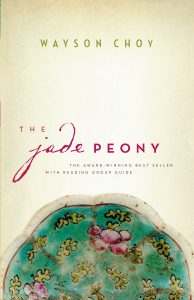
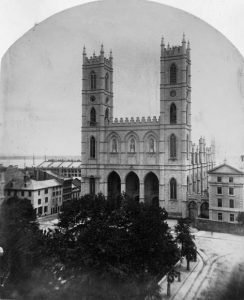
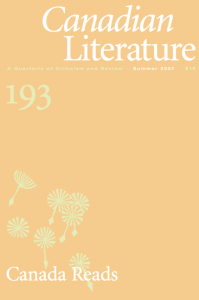
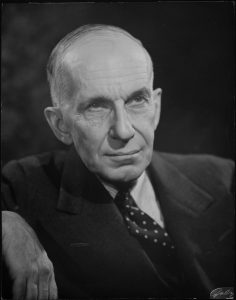
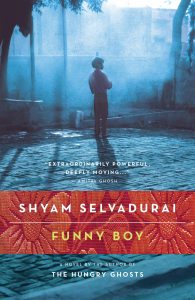
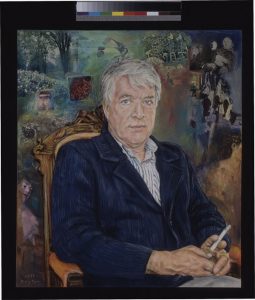
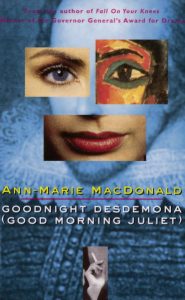
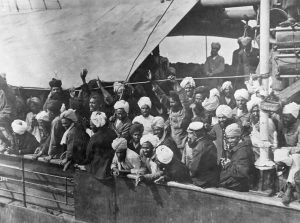
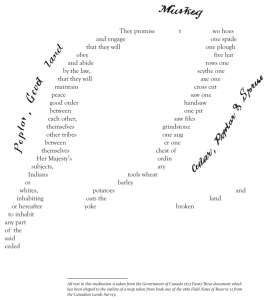
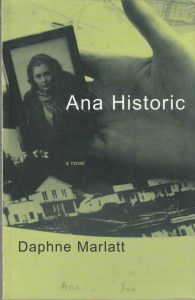
 ©
©